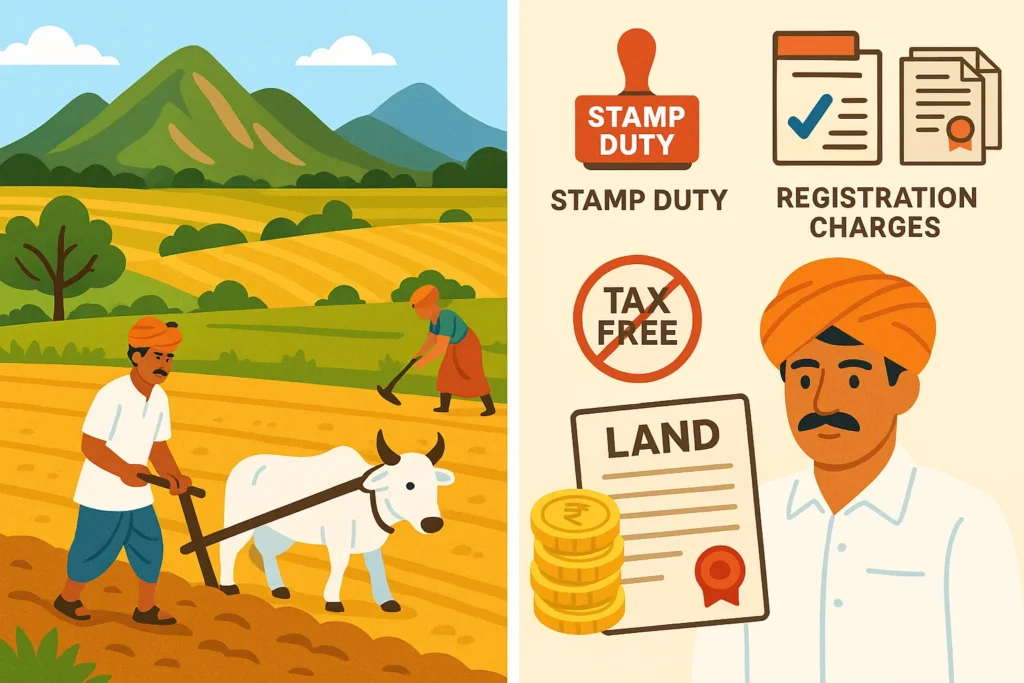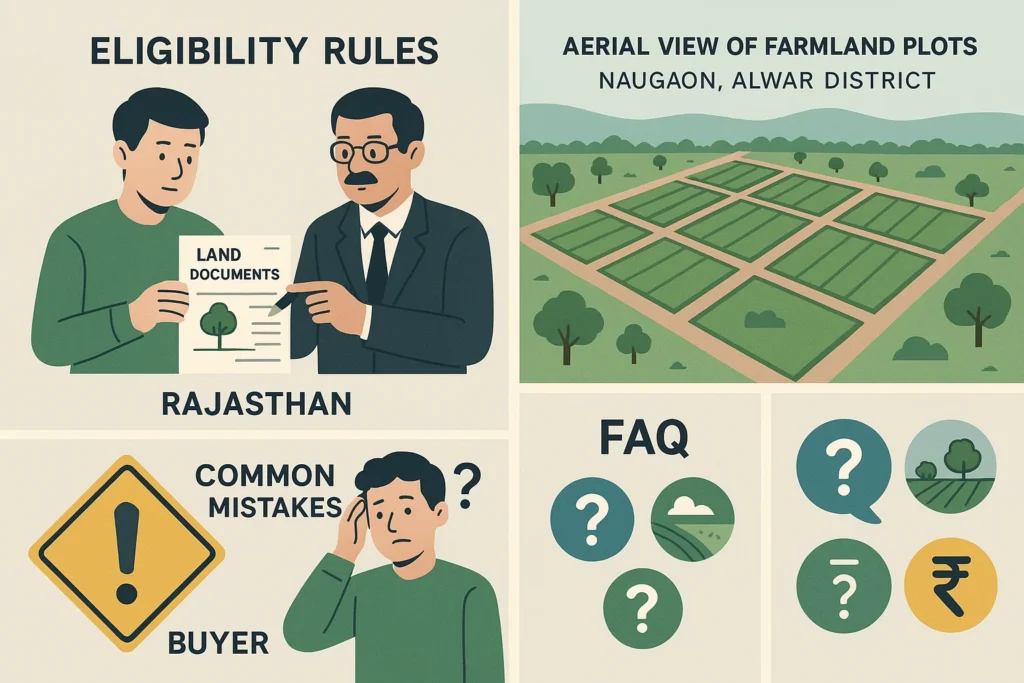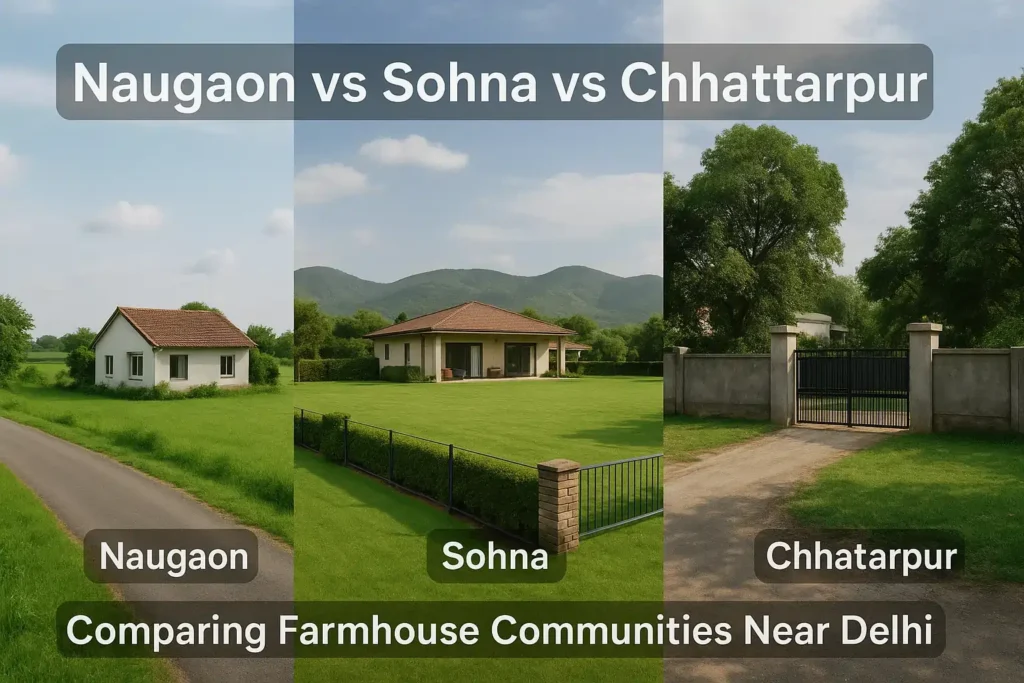Agricultural land has always been an attractive investment in India. Beyond farming, many buyers see it as a secure long-term asset. Rajasthan, with its vast land resources and areas like Naugaon and Alwar, has become a hotspot for farmland investment.
This is where it gets tricky though, agricultural land does not come without its own tax structure, eligibility requirements, and government regulations. Most of the buyers rush into this without knowing the Agriculture Land Taxation Policy in the state of Rajasthan or about the possible tax benefits of purchasing agricultural land in India.
This guide simplifies everything—from stamp duty rates to income tax rules—so you can make a well-informed investment decision.

Agriculture Land Taxation Policy in Rajasthan
The farmland of Rajasthan is regulated by a combination of state regulations and central taxation. These are the kind of policies that you should be aware of before making an expensive error.
Eligibility to Buy Farmland in Rajasthan
- By default, only farmers can purchase agricultural land in Rajasthan.
- Non-farmers face restrictions unless they inherit land or seek government approvals.
- Some states in India allow anyone to buy farmland, but Rajasthan maintains stricter rules to protect agricultural resources.
Before closing a deal, you must always ensure that you have checked with the local authorities about whether you are eligible.
Stamp Duty on Agricultural Land in Rajasthan
- Stamp duty is a one-time tax paid at the time of property registration.
- In Rajasthan, it ranges between 5–6% of the property’s market value.
- Buyers also pay 1% registration charges.
- Women buyers enjoy concessions, making investment slightly cheaper for them.
If you buy farmland worth ₹20 lakhs, expect to pay around ₹1.2 lakhs in stamp duty and ₹20,000 for registration.
Conversion Rules: Agricultural to Residential
- If you plan to use the land for housing or commercial activity, land conversion is mandatory.
- Conversion charges depend on location, land size, and purpose.
- Using farmland without conversion can lead to penalties.
Tax Benefits of Buying Agricultural Land in India
One of the biggest attractions of farmland investment is the tax advantages. Here’s a breakdown:
Agricultural Income Exemption (Section 10(1))
- Income earned from farming on agricultural land is not taxable.
- Profits from selling crops, fruits, or produce are exempt from income tax.
- This exemption applies only to genuine agricultural activity, not rental or commercial income.
Capital Gains Tax Exemption (Section 54B)
- If you sell agricultural land and buy another farmland within two years, you can claim exemption from capital gains tax.
- This benefit is available only to individuals or HUFs (Hindu Undivided Families).
No Wealth Tax on Agricultural Land
- Agricultural land is not treated as an “asset” under the Wealth Tax Act.
- Owning multiple acres does not increase your wealth tax liability.
Income Tax Rules on Sale of Agricultural Land
- Rural agricultural land (outside municipal limits) is exempt from capital gains tax when sold.
- Urban agricultural land may attract tax unless reinvested under Section 54B.

Practical Example – Buying Agricultural Land in Naugaon, Rajasthan
Let’s say you purchase 1 acre of farmland in Naugaon for ₹25 lakhs:
- Stamp Duty (5–6%): Around ₹1.25–1.5 lakhs
- Registration Charges (1%): ₹25,000
- Agricultural Income: If you earn ₹4–5 lakhs annually from crops, it is fully tax-free.
- Future Sale: If you sell the land after 5 years and reinvest in new farmland, you can claim capital gains exemption under Section 54B.
This makes farmland in Naugaon a profitable and tax-efficient investment.
Common Mistakes Buyers Make in Agricultural Land Transactions
Ignoring Eligibility Rules
Non-farmers often assume they can directly buy farmland, leading to legal disputes later.
Skipping Land Conversion
Some buyers use farmland for residential or commercial purposes without applying for conversion, which attracts fines.
Confusing Agricultural Income with Other Income
Only farming income is tax-free. Rental or business income from farmland is taxable.
Not Checking Agricultural Land Registration Charges in Rajasthan
Many buyers forget to calculate registration and stamp duty costs, which can significantly raise the investment budget.
FAQs on Agriculture Land Taxation in Rajasthan
Can non-farmers buy agricultural land in Rajasthan?
Generally no. Only farmers can purchase farmland, but exceptions exist for inheritance or with government approvals.
Is agricultural income taxable in India?
No. Income from genuine agricultural activities is exempt under Section 10(1) of the Income Tax Act.
What is the stamp duty rate on agricultural land in Rajasthan?
Around 5–6% of property value, plus 1% registration charges.
Do NRIs get tax benefits on agricultural land purchase?
NRIs cannot usually buy farmland in India unless they inherit it. Therefore, most tax benefits don’t apply to them.
Are there tax benefits when selling agricultural land?
Yes. If you reinvest sale proceeds in new farmland within two years, you can claim exemption under Section 54B.
Farmland in Rajasthan is not only soil but a very precious commodity with strong tax saving qualities.When you know the Agriculture Land Taxation Policy in Rajasthan, you can save yourself legal errors, pay less stamp duty and registration fees, and maximize on tax advantages of purchasing agricultural land in India.
When it comes to farmland in Naugaon or Alwar, you should consider checking medical eligibility, estimating stamp duty, and learning about exemptions. Farmland will ensure that you have a future financially, as well as ensure that you remain within the tax bracket with the correct approach.



